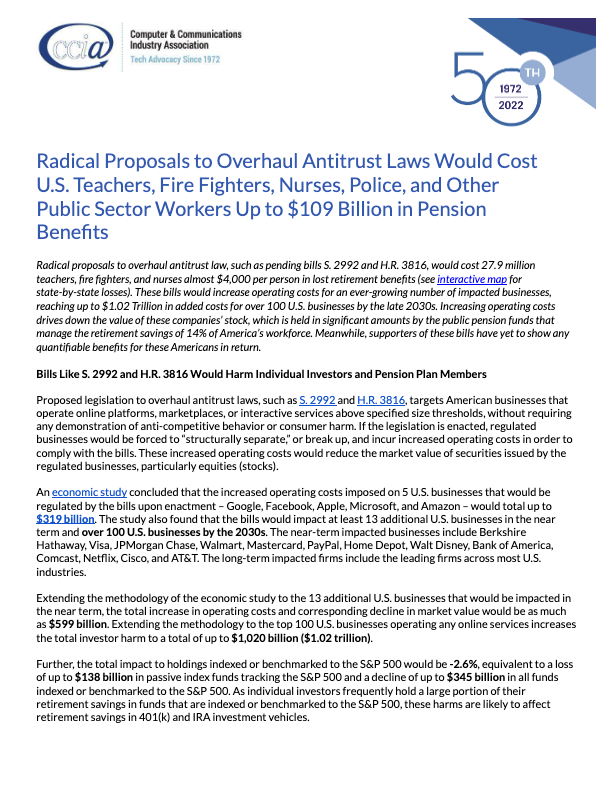Introduction
Radical proposals to overhaul antitrust law, such as pending bills S. 2992 and H.R. 3816, would cost 27.9 million teachers, fire fighters, and nurses almost $4,000 per person in lost retirement benefits (see interactive map for state-by-state losses). These bills would increase operating costs for an ever-growing number of impacted businesses, reaching up to $1.02 Trillion in added costs for over 100 U.S. businesses by the late 2030s. Increasing operating costs drives down the value of these companies’ stock, which is held in significant amounts by the public pension funds that manage the retirement savings of 14% of America’s workforce. Meanwhile, supporters of these bills have yet to show any quantifiable benefits for these Americans in return.
Bills Like S. 2992 and H.R. 3816 Would Harm Individual Investors and Pension Plan Members
Proposed legislation to overhaul antitrust laws, such as S. 2992 and H.R. 3816, targets American businesses that operate online platforms, marketplaces, or interactive services above specified size thresholds, without requiring any demonstration of anti-competitive behavior or consumer harm. If the legislation is enacted, regulated businesses would be forced to “structurally separate,” or break up, and incur increased operating costs in order to comply with the bills. These increased operating costs would reduce the market value of securities issued by the regulated businesses, particularly equities (stocks).
An economic study concluded that the increased operating costs imposed on 5 U.S. businesses that would be regulated by the bills upon enactment – Google, Facebook, Apple, Microsoft, and Amazon – would total up to $319 billion. The study also found that the bills would impact at least 13 additional U.S. businesses in the near term and over 100 U.S. businesses by the 2030s. The near-term impacted businesses include Berkshire Hathaway, Visa, JPMorgan Chase, Walmart, Mastercard, PayPal, Home Depot, Walt Disney, Bank of America, Comcast, Netflix, Cisco, and AT&T. The long-term impacted firms include the leading firms across most U.S. industries.
Map
Extending the methodology of the economic study to the 13 additional U.S. businesses that would be impacted in the near term, the total increase in operating costs and corresponding decline in market value would be as much as $599 billion. Extending the methodology to the top 100 U.S. businesses operating any online services increases the total investor harm to a total of up to $1,020 billion ($1.02 trillion).
Further, the total impact to holdings indexed or benchmarked to the S&P 500 would be -2.6%, equivalent to a loss of up to $138 billion in passive index funds tracking the S&P 500 and a decline of up to $345 billion in all funds indexed or benchmarked to the S&P 500. As individual investors frequently hold a large portion of their retirement savings in funds that are indexed or benchmarked to the S&P 500, these harms are likely to affect retirement savings in 401(k) and IRA investment vehicles.
Similarly, these changes in U.S. law would impact state and local government employee pension plans, whose assets fund the retirement benefits relied upon by 27.9 million American workers. Google, Facebook, Apple, Microsoft, and Amazon stocks are in many cases the top holdings of these pension funds. On average, 86% of these pension plans count these five companies among their top 10 holdings. The enactment of the bills would harm these pension plans to the tune of up to $109 billion in lost value from securities holdings by the late 2030s. This aggregate decreased valuation would imply an average loss of up to $3,928 per pension plan member. CCIA has created an interactive map that displays the likely aggregate and individual losses on a state-by-state basis.
As both investors and consumers, Americans would be harmed by these proposals. Increasing costs on impacted businesses would likely result in higher retail prices and loss of free services for consumers. Narrowing the projected harm to a single firm in the retail market, the study shows that the resulting harm to consumers would be up to $22 billion per year, equivalent to $148 per consumer per year. A simple lifetime annuity paying consumers $148 annually could be valued at up to $4,358, which is a reasonable upper bound on the lifetime consumer welfare harm per consumer for each impacted service. Therefore, for an individual who uses this service and is also a state and local government employee pension plan member, bills like S. 2992 and H.R. 3816 would thus be expected to harm them by up to $8,286 (as consumers, by more than $4,358, and as retirement plan members, by up to $3,928).
Radical proposals like S. 2992 and H.R. 3816 would lead to increased costs and lost retirement savings for millions of Americans, while supporters of the bills have offered no quantitative economic analysis of the costs and benefits of the bills that show any quantifiable benefits for those Americans in return.




